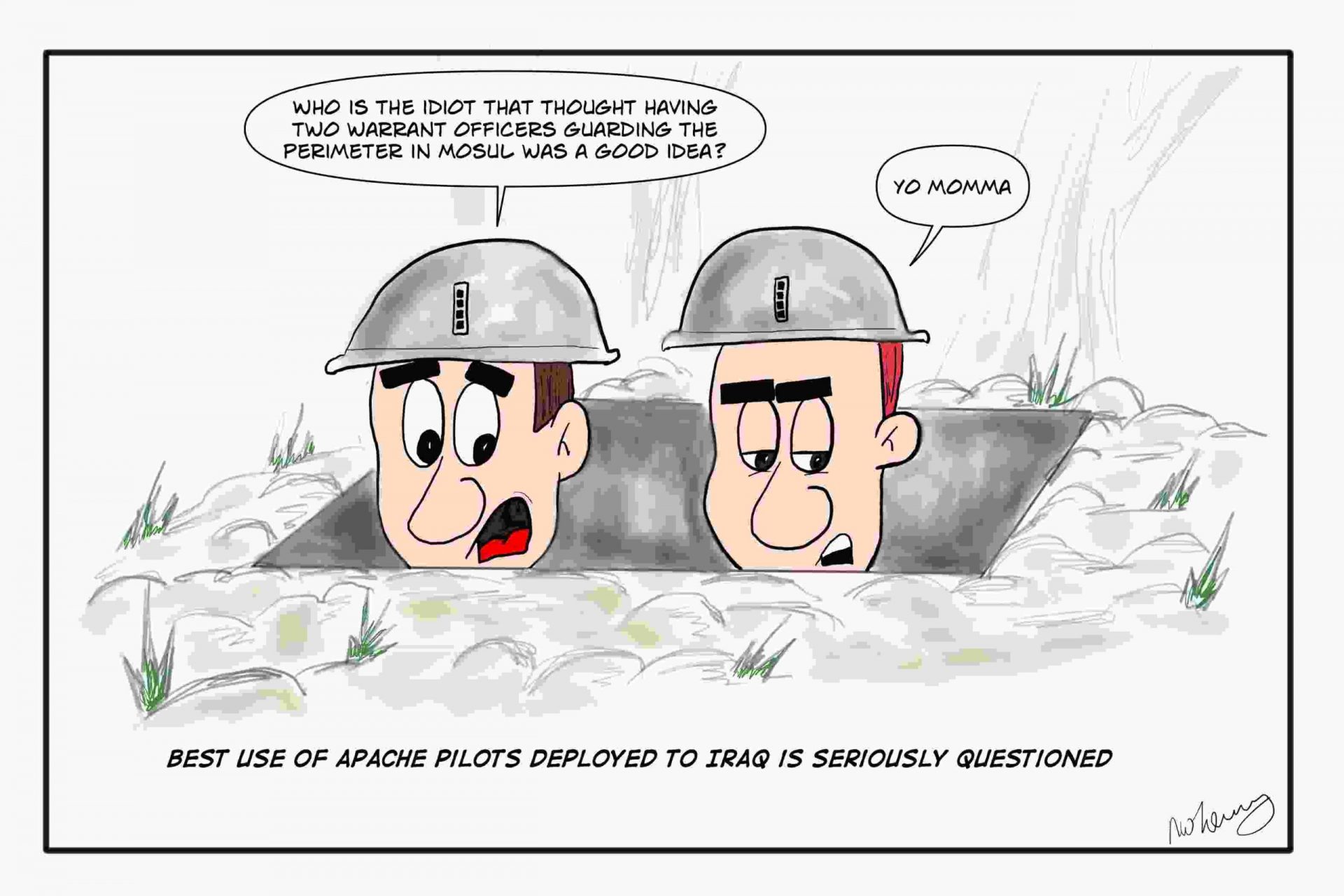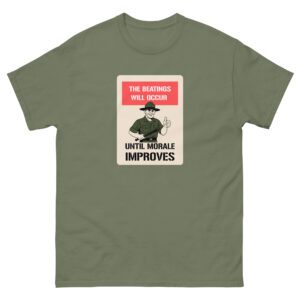The Foxhole Chronicles: When Apache Pilots Became Infantry in Iraq
Picture this: You’re deep in Iraq, somewhere in the middle of nowhere, sand in places you didn’t even know you had, and suddenly you find yourself in a situation that no amount of Army training could have prepared you for. You’re an Apache pilot, used to flying high above the battlefield, looking down at the chaos like a god from Mount Olympus. But today, instead of being strapped into the cockpit of your sleek bird, you’re… in a foxhole. With infantry.
And let me tell you, there’s nothing that shakes an Apache pilot’s ego quite like being told, “Hey, you’re guarding the flank today. No, not with missiles—with a rifle.”
This is the true story of how a group of Army Warrant Officers—Apache pilots, the kings of the sky—found themselves stuck in a foxhole, doing infantry work in the middle of Iraq. And trust me, it’s about as glamorous as it sounds.
The Setup: No Ammo, No Fuel, No Support
It started like any other day in the desert—hot, dry, and full of questionable military logic. The Apaches were grounded. Why? Because there was no fuel, no ammo, and (as a bonus round of bad luck) no ground support to guard the aircraft. In other words, these flying tanks with wings were about as useful as a doorstop.
“Well, guess we’re stuck,” Warrant Officer Davis muttered as he kicked a rock. “No point in flying without anything to shoot.”
“Couldn’t we just… you know, pretend?” Warrant Officer Thompson joked, tapping the side of his helmet. “Tell the bad guys we’re armed and hope they buy it?”
Davis rolled his eyes. “Yeah, I’m sure the insurgents will just surrender when they hear the rotor blades. ‘Oh no, an unarmed Apache! Run for the hills!’”
But the real kicker came when their commanding officer strolled over with a grin that only someone not stuck in a foxhole could wear.
“Alright, boys,” he said. “Since you’re not flying today, you’ll be guarding the flank. You know, like infantry.”
The pilots exchanged horrified glances. Infantry? That was the stuff of low-flying grunts, the guys with boots on the ground who kicked down doors and lived in the dirt. Pilots were supposed to be above all that—literally.
“Sir, I’m not sure if you know this, but we’re pilots,” Warrant Officer Jacobs said cautiously, as if maybe, just maybe, the CO had forgotten this small detail. “We don’t… guard things. We fly things.”
The CO shrugged. “Well, today you guard things. Here’s a rifle. Welcome to the ground war.”
Life in the Foxhole: Infantry for a Day
And so, there they were, a group of highly trained, incredibly specialized Apache pilots, crammed into a foxhole, rifles in hand, looking out over the barren Iraqi desert like a bunch of rookies on their first day of basic training.
Warrant Officer Davis sighed, adjusting his helmet, which was now far less useful without a cockpit to sit in. “This is not what I signed up for.”
“I don’t even know what I’m supposed to be looking for,” Warrant Officer Thompson added, peeking over the edge of the foxhole. “What if the enemy comes from… over there?” He pointed vaguely in the direction of the sun, which was probably the closest thing they had to a threat at the moment.
“Relax, we’ll hear them coming,” Jacobs said, trying to stay positive. “I mean, it’s the desert. How sneaky can they be?”
But of course, that was the exact moment something rustled in the distance. All heads snapped in the direction of the noise, eyes wide, hearts pounding. Was this it? Had they been out here five minutes and were already about to face the enemy?
“Everyone stay calm,” Davis whispered, clutching his rifle like it was the joystick of his Apache. “Remember your training.”
“Training?” Thompson hissed. “My training involves flying. Not this.”
The noise grew louder, and for a brief, terrifying moment, the pilots were convinced they were about to face their first (and probably last) ground engagement.
But as the dust settled, out came… a goat.
The group stared, slack-jawed, as the goat trotted past them without so much as a glance in their direction.
“Great,” Thompson muttered. “We’re being outmaneuvered by livestock.”
A Different Kind of Mortar Fire
As the day dragged on, morale in the foxhole hit rock bottom. There’s only so much excitement a group of pilots can take when the only “enemy” they’ve encountered is a goat, and their rifles are starting to feel more like awkward paperweights than weapons.
“I miss my Apache,” Davis muttered, staring into the distance with the forlorn look of a man whose true love was just out of reach. “She never let me down.”
“At least in the sky, you know who your enemy is,” Jacobs agreed. “Down here, it’s just dirt, heat, and… whatever that smell is.”
Thompson raised an eyebrow. “That smell is us. We’ve been in this foxhole for hours.”
But just when they thought the day couldn’t get any worse, they were hit with the ultimate insult: a mortar round. Not from the enemy—oh no—but from a bird. A passing bird that chose their foxhole as the perfect target for some, shall we say, biological warfare.
“You’ve got to be kidding me!” Davis shouted, wiping the splatter off his helmet.
“Well,” Jacobs said, barely holding back laughter, “looks like we’ve been outgunned again. First the goat, now this.”
The Moral of the Story: Pilots Don’t Make Good Infantry
As the sun set over the desert, the pilots finally got word that fuel and ammo were on the way. The foxhole duty was over. They could go back to doing what they did best: flying.
As they clambered out of the foxhole, covered in sweat, dirt, and bird excrement, Warrant Officer Thompson turned to the group. “So, what did we learn today?”
“That we suck at being infantry?” Davis offered.
“And that goats are sneakier than we thought,” Jacobs added.
Thompson nodded. “Exactly. And most importantly—never let them take us out of the cockpit again.”
With that, the group walked off toward their grounded Apaches, ready to leave their brief stint as infantry behind. After all, they were pilots, kings of the sky. As for foxholes? That was a lesson they hoped never to repeat.
Because when you’ve been mortared by a bird, there’s really nowhere to go but up.
The End









